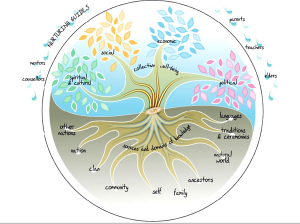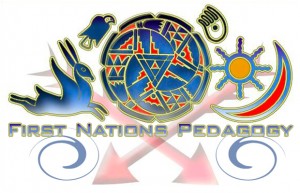FIRST VOICES (Brentwood Bay, BC)
First Voices is a suite of web-based tools and services designed to support Aboriginal peoples engaged in language archiving, language teaching and culture revitalization. The First Voices language tutor is a free software that can be downloaded and local language archived in it, games and other language learning activities can be developed with the software. It support instructor and student tracking. The First Voices Language Archive contains about 60 different language communities at this time, some publicly accessible, some not.
http://www.firstvoices.com/
The First Nations Interactive Holistic Lifelong Learning Model:
I really liked this interactive flash model for holistic learning. It is a good example of how technology can support the interconnected webs of relationships in First nations communities and in education.
http://www.ccl-cca.ca/pdfs/RedefiningSuccess/CCL_Learning_Model_FN.pdf
http://cli.ccl-cca.ca/FN/index.php?q=model
A Victory for the Tsilhqot’in
Blue Gold: The Tsilhqot’in Fight for Teztan Biny (Fish Lake) This is a fabulous film that shows the power that media can have to change the course of events when a community decides to take a stand. Blue Gold expresses the Tsilhqot’in peoples’ unanimous rejection of Taseko Mines Ltd.’s proposal to drain Teztan Biny (Fish Lake) in order to stockpile mining waste. They had help to make the film from R.A.V.E.N. and assistance with fundraising. This is an approach being taken more and more by small indigenous communities to reach the mainstream population – many of whom support the causes if they know about them. http://www.raventrust.com/video-bluegold.html
Alanis Obomsawin
One of Canada’s most distinguished filmmakers, she has worked at the NFB for over 40 years. when I was researching aboriginal film I found out that she was the director of the incredible film that I saw years ago:Kanehsatake: 270 Years of Resistance . She has made so many films and is passionate about speaking out for aboriginal people. She also received an Honourary Degree from UBC recently where she gave a speech honouring the NFB for supporting her work.
http://www.onf-nfb.gc.ca/eng/portraits/alanis_obomsawin/
National Panel on First Nations Education: News Release – Equitable Funding, Language, Culture and Technology Key to Improving High School Graduation Rates
It looks like there is money being made available to make some concrete improvements in First Nations education. Calls for improvement in funding, integrating culture and language into curriculum and ensuring equitable access for all First Nations students has been going on for a long time. “Closing the gap between educational achievement for youth in mainstream society and First Nations’ youth is the single biggest shot in the arm we can give Canada’s economy where demand for skilled and knowledge-based workers is likely to remain greater than our ability to produce them,” said Panel Chair Scott Haldane.
Hui, Stephen, First Nations Students need Internet Technology, advocates say, Georgia Straight, September 3, 2009.
Even if remote communities have technology often it is difficult at home and school to make good use of them because of the poor bandwidth. Remote communities all over Canada have been promised better bandwidth in these communities but most are still waiting. Technology would open access to online support for high school specialist courses in maths and sciences, technology skills, programs that can support digital music and art in areas where only four or five students makes it not economical to have a teacher in the community.
http://www.straight.com/article-254208/first-nations-kids-need-net

